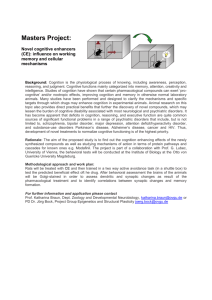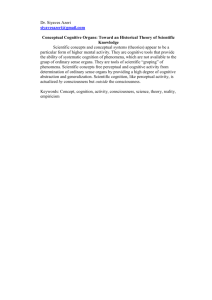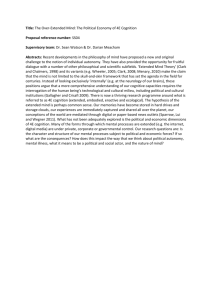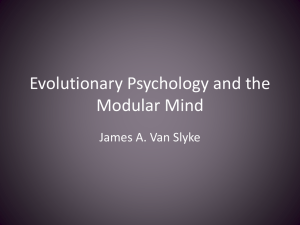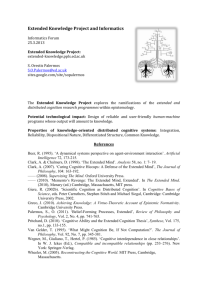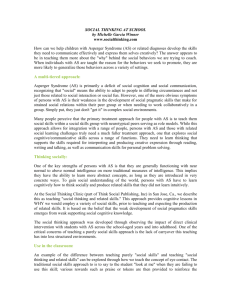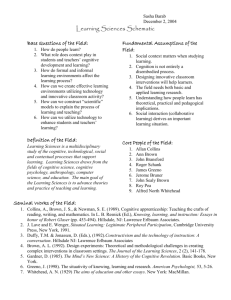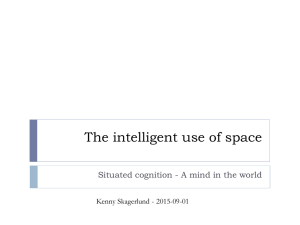The Augmenting Cognition Era: Professor Idan Segev
advertisement
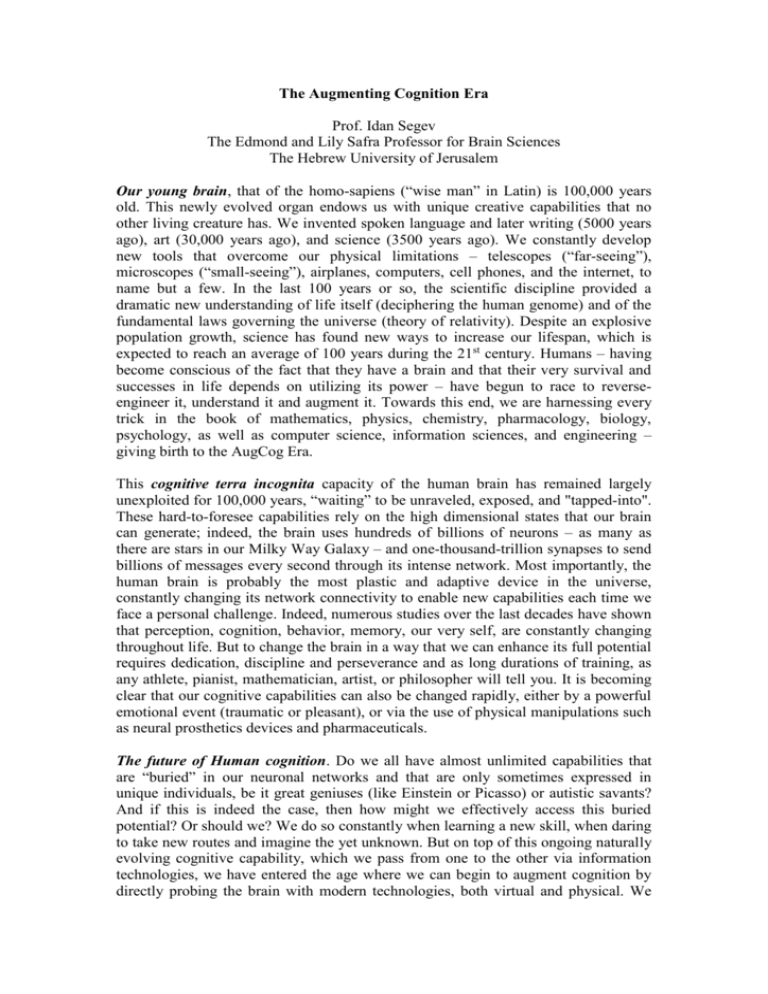
The Augmenting Cognition Era Prof. Idan Segev The Edmond and Lily Safra Professor for Brain Sciences The Hebrew University of Jerusalem Our young brain, that of the homo-sapiens (“wise man” in Latin) is 100,000 years old. This newly evolved organ endows us with unique creative capabilities that no other living creature has. We invented spoken language and later writing (5000 years ago), art (30,000 years ago), and science (3500 years ago). We constantly develop new tools that overcome our physical limitations – telescopes (“far-seeing”), microscopes (“small-seeing”), airplanes, computers, cell phones, and the internet, to name but a few. In the last 100 years or so, the scientific discipline provided a dramatic new understanding of life itself (deciphering the human genome) and of the fundamental laws governing the universe (theory of relativity). Despite an explosive population growth, science has found new ways to increase our lifespan, which is expected to reach an average of 100 years during the 21st century. Humans – having become conscious of the fact that they have a brain and that their very survival and successes in life depends on utilizing its power – have begun to race to reverseengineer it, understand it and augment it. Towards this end, we are harnessing every trick in the book of mathematics, physics, chemistry, pharmacology, biology, psychology, as well as computer science, information sciences, and engineering – giving birth to the AugCog Era. This cognitive terra incognita capacity of the human brain has remained largely unexploited for 100,000 years, “waiting” to be unraveled, exposed, and "tapped-into". These hard-to-foresee capabilities rely on the high dimensional states that our brain can generate; indeed, the brain uses hundreds of billions of neurons – as many as there are stars in our Milky Way Galaxy – and one-thousand-trillion synapses to send billions of messages every second through its intense network. Most importantly, the human brain is probably the most plastic and adaptive device in the universe, constantly changing its network connectivity to enable new capabilities each time we face a personal challenge. Indeed, numerous studies over the last decades have shown that perception, cognition, behavior, memory, our very self, are constantly changing throughout life. But to change the brain in a way that we can enhance its full potential requires dedication, discipline and perseverance and as long durations of training, as any athlete, pianist, mathematician, artist, or philosopher will tell you. It is becoming clear that our cognitive capabilities can also be changed rapidly, either by a powerful emotional event (traumatic or pleasant), or via the use of physical manipulations such as neural prosthetics devices and pharmaceuticals. The future of Human cognition. Do we all have almost unlimited capabilities that are “buried” in our neuronal networks and that are only sometimes expressed in unique individuals, be it great geniuses (like Einstein or Picasso) or autistic savants? And if this is indeed the case, then how might we effectively access this buried potential? Or should we? We do so constantly when learning a new skill, when daring to take new routes and imagine the yet unknown. But on top of this ongoing naturally evolving cognitive capability, which we pass from one to the other via information technologies, we have entered the age where we can begin to augment cognition by directly probing the brain with modern technologies, both virtual and physical. We should use these new capabilities very carefully, as they could potentially change the essence of who we are. Augmenting impaired cognition – technological and ethical considerations There is a price for having highly developed cognitive capacity as humans do; the cognitive system is delicate and fragile, and often expresses malfunctions as in the case of autism, Parkinson's, and schizophrenia. Can we utilize new scientific tools to augment cognition in such patients? And what are the limits of treatment in these patients? Eventually, the limit of such treatments will be determined by two main aspects technology and ethics. Today, brain-machine interface devices are limited in the ways they can measure and estimate the state of the diseased brain, as well as in their ability to appropriately stimulate the diseased brain. Indeed most current deep-brainstimulation devices consist of only several stimulating electrodes, each affecting a huge numbers of neurons. Clearly, we should improve our ability to record from many (thousands and perhaps millions) neural elements, to understand the information represented by these cells and to enable parallel and accurate stimulation of the malfunctioning networks of neurons in order to provide maximal therapeutic effects with minimal side effects. One promising direction is to copy the adaptive/learning strategies of the normal brain in order to adjust our stimulation for optimal treatment of the patients. The ethical aspects of treating patients with severe mental disorders are even more challenging. The Portuguese philosopher George Santayana said: "Those who cannot remember the past are condemned to repeat it." Driven by the urgent need to help their psychiatric patients, 20th century neurologists and psychiatrists (such as Egas Moniz who was awarded the Nobel Prize in 1949, and Walter Freeman) applied and justified (orbital) frontal lobotomy as a fast and minimally risky procedure for patients with severe mental disorders. Today, the medical and scientific community as a whole condemn the frontal lobotomy procedure as "contrary to the principles of humanity." The future development of deep brain stimulation (DBS) and brain-machine interfaces as a clinical procedure for mental disorders should aim to avoid a repetition of previous mistakes in helping psychiatric patients. First, they should be based on solid animal research and a firm understanding of the physiology and pathophysiology of the nervous system. Our current ethical standards for human patients are much more strict than in the middle of the 20th century, putting the needs of the patient ahead of those of society and caregivers. Surgical intervention should only be offered and performed in patients in which all other forms of drug and therapies have failed. The suggested procedures should be reversible and adjustable (unlike the frontal lobotomy). Our long experience with DBS (~100,000 patients worldwide and more than 300 since 2004 at the Hadassah-University Medical Center) ensure that the procedure is safe, fully mastered, and has minimal adverse effects such as bleeding and infection. Finally, modern human clinical research is based on evidence-based medicine (and reports also negative results), and therefore we are better protected from our biased initial hypotheses and misleading results from animal experiments that may be not translated to human patients. Intelligent Machines and the Human Brain. Intelligent machines are rapidly becoming a part of our world. In recent years they have made impressive strides and in some areas, they have begun to rival human capacities, with far-reaching technological and economical implications. Progress in the development of intelligent systems comes from the combination of two areas of research: computer science and neuroscience. These newly developed intelligent systems compliment our own (human) intelligence – with far-reaching sociological, industrial and psychological impact. Digital technologies and Human Cognition. What will happen to our mind if the external world changes in unprecedented ways, for example with an all-pervasive digital technology? A recent survey in the US showed that over half of teenagers aged 13 to 17 spend more than 30 hours a week, outside school, using computers and other web-connected devices. The implications of such a sweeping change in mind set, - let us call it ‘Mind Change’ - must surely extend deep and wide into future policy. First, eye contact is a pivotal and sophisticated component of human interaction, as is subconscious monitoring of body language and, most powerful of all, physical contact, yet none of these experiences is available on social networking sites. It follows that if a young brain with the evolutionary mandate to adapt to the environment is establishing relationships through the more sanitised medium of a screen, the skills that are so essential for empathy may not be acquired as naturally, as well or as quickly as in the past. In line with this prediction, a recent study from Michigan University of 14,000 college students has reported a decline in empathy over the past 30 years, which was particularly marked over the past decade. Secondly, on video games, neuropsychological studies suggest that frequent and continued playing might lead to enhanced recklessness. Perhaps this is not surprising as it is surely a dangerous lesson to learn that actions do not have consequences and that victims of a shooting can become "undead" the next time around. In addition, data indicates reduced attention spans and even possible addiction. In line with this, significant chemical and even structural changes are being reported in the brains of obsessional gamers that require at the very least wider discussion beyond the scientific community. Thirdly, on search engines, can the internet actually improve cognitive skills and learning, as has been argued? The problem here is that efficient information processing is not synonymous with knowledge or understanding, a point well argued and supported by empirical evidence and summarised in Nicholas Carr's book The Shallows. Given the plasticity of the human brain, it is not surprising that adaption to a cyberenvironment will also lead to various positives. For example, enhanced performance in a variety of skills that are continuously rehearsed, such as a mental agility similar to that needed in IQ tests or in visuo-motor coordination. However, we need urgently to gain a much fuller picture and, consequently, design of truly innovative software that attempted to offset some of the perceived deficiencies arising from the current digital culture. Science and technology are having an unprecedented impact on the length and quality of our lives. We have an extended life span and extended leisure time. Like climate change, this transformational scenario of "Mind Change" is complex, unprecedented and controversial. However, unlike climate change, the end point is not one of just damage limitation, but rather of ensuring that we deliver to the next generation an environment that can for the first time enable the realisation en masse of each individual's full potential. What is clear is that we are already in the AugCog era, where direct manipulation of the brain’s activity can augment human cognition. With the five top experts in this field, this Augmenting Cognition session will discuss this incredible new chapter in human history.

